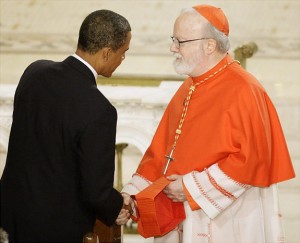 Former exorcist and current Louisiana governor Bobby Jindal has (to quote the Friendly Atheist) “pushed for a voucher program that would allow state funds to be used to pay for religious schools.” The Friendly Atheist is not so keen on the idea (he believes it to be unconstitutional), but I’m inclined to be more relaxed. A little mumbo jumbo is a cheap price to pay for a good education. Religious schools in this country (and elsewhere) have a long record of delivering an education that can be of lower cost and higher quality than that provided for in the state system. And they also have a long and shameful record, not least in corners of the Islamic world, as perpetrators of ignorance and division.
Former exorcist and current Louisiana governor Bobby Jindal has (to quote the Friendly Atheist) “pushed for a voucher program that would allow state funds to be used to pay for religious schools.” The Friendly Atheist is not so keen on the idea (he believes it to be unconstitutional), but I’m inclined to be more relaxed. A little mumbo jumbo is a cheap price to pay for a good education. Religious schools in this country (and elsewhere) have a long record of delivering an education that can be of lower cost and higher quality than that provided for in the state system. And they also have a long and shameful record, not least in corners of the Islamic world, as perpetrators of ignorance and division.
The key is regulation. To secure eligibility for voucher-status, religious schools, and what they teach (not too much mumbo jumbo, please, admission for both sexes, and members of all faiths and of none, and so on), would have to go through a tough vetting both to begin with and, say, annually. And, if the experience in the UK is anything to go by, you’d probably need to vet the vetters too. I don’t know whether Gov. Jindal’s legislation provides for all this or not, but, in any event, it would be unlikely to be enough for one Louisiana (Republican) lawmaker. Valarie Hodges.
Livingston Parish News takes up the story:
WATSON — Rep. Valarie Hodges, R-Watson, says she had no idea that Gov. Bobby Jindal’s overhaul of the state’s educational system might mean taxpayer support of Muslim schools.
“I actually support funding for teaching the fundamentals of America’s Founding Fathers’ religion, which is Christianity, in public schools or private schools,” the District 64 Representative said Monday.
“I liked the idea of giving parents the option of sending their children to a public school or a Christian school,” Hodges said…HB976, now signed into law as Act 2, proposed, among other things, a voucher program allowing state educational funds to be used to send students to schools run by religious groups…Hodges, who represents District 64 on the northwest side of the parish, and another freshman lawmaker in the local delegation, Clay Schexnayder from Dist. 81 in the southwest, voted with the House majority in favor of HB976.
The school funding mechanism, however, did not come up for a vote until the end of the session. By then, a Muslim-based school had applied for support through the new voucher system.
During debate over the MFP (Minimum Foundation Program) funding formula, Hodges learned more about the consequences of the educational changes. She voted against the new MFP funding formula; Schexnayder voted for it.
“Unfortunately it will not be limited to the Founders’ religion,” Hodges said.
Oh dear. I’m not necessarily opposed to (mild, constructive, gently patriotic, and minimally superstitious) state religions, but I suspect—well over two centuries into the First Amendment—that the time for that in the US may have passed.






